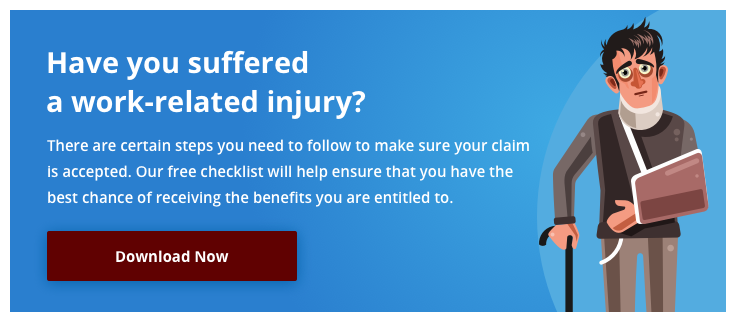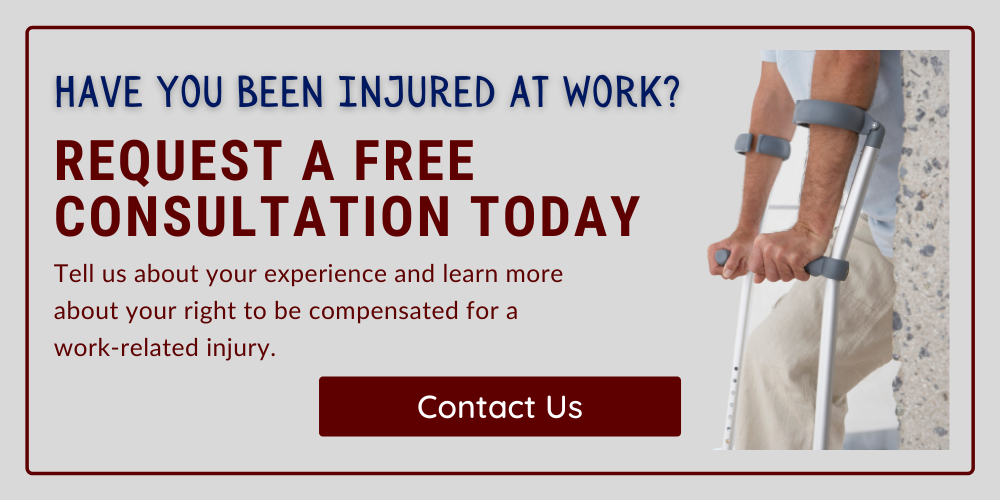This blog recently updated in January 2022 and was originally published in Aug 25, 2018.
Workers’ compensation may provide benefits to employees with a hernia that was directly or indirectly caused by work activities
 Hernias affect about 5% of the population at some point in their lives. Different kinds of hernias occur for different reasons. Sometimes the physical exertion of working, or health conditions caused by working, can contribute to the development of a hernia. Since other factors may also cause a hernia, workers’ compensation insurance adjusters often resist paying hernia-related benefits. This begs the question: Can a Hernia Be a Work-Related Injury? Having the assistance of a Santa Rosa workers’ compensation attorney can help injured worker’s with hernias maximize their workers’ comp benefits.
Hernias affect about 5% of the population at some point in their lives. Different kinds of hernias occur for different reasons. Sometimes the physical exertion of working, or health conditions caused by working, can contribute to the development of a hernia. Since other factors may also cause a hernia, workers’ compensation insurance adjusters often resist paying hernia-related benefits. This begs the question: Can a Hernia Be a Work-Related Injury? Having the assistance of a Santa Rosa workers’ compensation attorney can help injured worker’s with hernias maximize their workers’ comp benefits.
Understanding Hernias
A hernia occurs when an organ pushes through the muscles and tissues that hold it in place. Hernias typically occur in the abdomen or groin, although they occasionally appear in other parts of the torso.
The most common hernias are inguinal hernias. They occur when intestines push through a weak spot in the lower part of the abdomen, typically in the inguinal canal. The inguinal canal is a passage between the abdominal wall and the groin. A lump in the area where the groin and thigh meet is typically caused by an inguinal hernia.
Some hernias (particularly umbilical hernias, which appear in the naval) occur in babies. Hiatal hernias occur when part of the stomach protrudes through the diaphragm into the chest cavity. Hiatal hernias in children usually result from a birth defect. Otherwise, they typically affect people over the age of 50. The most common symptom of hiatal hernia is heartburn and other symptoms include pain in the upper abdomen, nausea, vomiting, heartburn, and bloating while some people with hiatal hernias have no symptoms at all.
Types of Hernias
Except for hernias that develop in babies and infants, hernias are usually caused by a combination of two factors: muscle weakness and activity which strains the muscle. Other than birth defects and congenital conditions, muscles can be weakened in many ways, including:
- Abdominal surgery
- Chronic coughing
- Aging
Activities that can strain the body and push an organ through a weak area in a muscle include:
- Heavy lifting
- Weight gain
- Constipation
- Persistent coughing or sneezing
- Pregnancy
Symptoms of an inguinal hernia may include pain or discomfort in the lower abdomen, especially when bending, lifting, or coughing. Certain exercises might reduce the symptoms of a hernia, but most inguinal hernias need to be surgically repaired. The risk of inguinal hernias increases as people get older and gain weight and is higher for men than women. In fact, one study found that about three-quarters of all inguinal hernias occurred in men and that more than half occurred at work. According to a study by Professor Andrew Kingsnorth and Karl Leblanc, inguinal hernias account for 75% of abdominal wall hernias with a lifetime risk of 27% in men and 3% in women.
Hernias and Work
Hernias are often work-related. The physical strain of working can be a direct cause of a hernia. If a job involves lifting heavy objects and a hernia (and/or abdominal pain) is first noticed after lifting, the hernia is probably work-related.
Even if the strain that produces a hernia is not work-related, one’s work might indirectly contribute to the muscle weakness that allows the hernia to develop. For example, if muscle weakness was caused by repetitive heavy lifting or arduous work, or by abdominal surgery that was necessary to correct a work injury, work may be an indirect cause of the hernia. Work environments that cause a worker to cough repeatedly, work injuries that lead to weight gain while unable to work, and medication for work injuries that cause constipation might all contribute to weakened abdominal muscles and thus cause a hernia.
Workers’ Compensation Benefits for Hernias
Courts in California have long held that “Industry takes the employee as it finds him.” In other words, an employer cannot avoid providing workers’ compensation benefits by claiming that an employee who developed a hernia after heavy lifting had a weakened abdominal wall that was not the employer’s fault. Even if another employee with a healthy abdominal wall may have been able to do the same lifting without injury. Either way, the employer is responsible for providing workers’ compensation benefits if the lifting contributed to the hernia.
Accordingly, when work directly or indirectly contributes to the development of a hernia, the employer may be liable for medical treatment for the hernia, including any corrective surgery that may be necessary. The employer may also be liable for temporary disability benefits while the injured worker is unable to work because of the hernia.
Hernias can also affect the work restrictions a doctor might impose when the injured worker returns to work. For example, if lifting at work caused a hernia and the treating physician determines that the injured worker can return to work but must lift no more than 10 pounds until the condition heals, the employer must offer work that meets that work restriction or must continue to pay temporary disability benefits.
Permanent disability benefits may also be due if a hernia causes permanent impairment after treatment for the hernia ends. In those circumstances, the injured worker’s Santa Rosa workers’ compensation lawyer and the claims adjuster may decide to negotiate a settlement.
Employers are only responsible for that portion of permanent disability that was caused by work. Therefore, if a doctor determines that a weakened abdominal wall was partly caused by smoking, for example, a Qualified Medical Examiner (QME) would then need to apportion the disability by deciding the percentage that was caused by work and the percentage that was caused by smoking. Many times lawyers and claims administrators will negotiate a settlement that takes apportionment into account.
If you develop a hernia while working or that you otherwise believe might be work-related, you need to act quickly. Work-related injuries need to be reported to an employer as soon as possible. To ask a Santa Rosa workers’ compensation attorney for advice about your hernia, call Kneisler & Schondel at (707) 542-5132. You can also ask us a question by submitting our online contact form.

